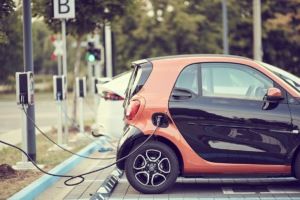News
Petrol and diesel drivers lose 5,000 parking spaces in Copenhagen
This article is more than 3 years old.
5,000 parking spaces for conventional cars will be closed to make room for 4,100 charging spaces and 900 car-share spaces – one of the city’s conservative mayors has called the decision “insane”

Very good chance it has a Chinese battery and that the energy comes from a solar panel produced in China (photo: Pxfuel)
In Copenhagen, a city where bicycles outnumber automobiles by nearly six to one, those few residents who elect to drive a car will soon have even more trouble finding a space to park – unless they switch to electric.
Copenhagen Municipality has decided to eliminate 5,000 parking spaces for petrol and diesel cars and replace them with 4,100 electric vehicle charging spaces and 900 car-share parking spaces. The transition will take place over the next three years.
Conservative criticism
The decision has been met with condemnation from the right – particularly from members of Konservative.
“We think it is totally insane to take away conventional parking spaces when there is already a shortage of them,” Jakob Næsager, the children and youth mayor, told TV2.
Instead, Næsager and other members of his party have argued that electrical vehicle and car-sharing spaces should be developed in addition to existing spaces, rather than replacing them.
“It is becoming harder and harder for Copenhageners to find a parking space. There is already a shortage of parking spaces in all bridge districts, and taking these spaces out is making a mockery of Copenhageners,” said Næsager.
The mayor responds
The Lord Mayor of Copenhagen, Sophie Hæstorp Andersen, has said the reduction of parking for petrol and diesel cars is intentional – and necessary.
“4,000 parking spaces may sound like a lot, but when we look at how many there are in total in Copenhagen, it is unfortunately still a fraction. If we want the green development, then we must be at the forefront,” said Andersen.
By making it less convenient to own a vehicle reliant on fossil fuels – while at the same time making it more convenient to own an electric vehicle – Andersen hopes the decision will have an impact on Copenhageners’ purchasing decisions.
“If we continue to arrange the city according to the needs of cars and not people, then we could provide the city with a lot of parking spaces. But what we want Copenhageners to do is replace the car with an electric car,” said Andersen.
Danish motorists’ club backs up plan
FDM, a private interest organisation working on behalf of Danish motorists, supports the plan.
“Electric cars and rechargeable cars are currently being sold like never before, and it will only become more pronounced,” Dennis Lange, the chief consultant at FDM, told TV2.
According to Lange, with only 1,300 electric car spaces currently in Copenhagen, there is already a shortage of charging locations for electric vehicle owners. Consequently, says Lange, prioritising the expansion of electric vehicle infrastructure is the “right way to go”.










































